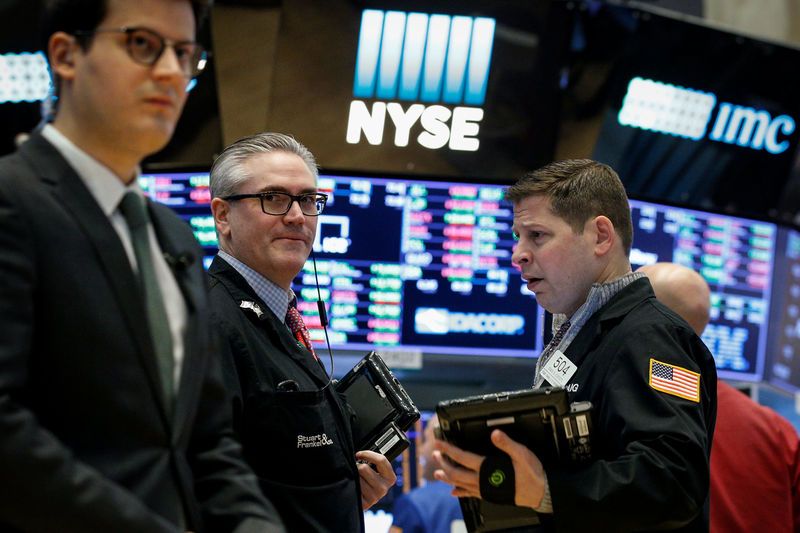By Claire Milhench
LONDON (Reuters) - Global investors cut their equity exposure to a three-month low in February after markets went into freefall early in the month and volatility spiked, though most still expect stocks to test new highs despite rising bond yields.
Reuters' monthly asset allocation poll of 51 wealth managers and chief investment officers in Europe, the United States, Britain and Japan was carried out between Feb. 12-26, after a savage sell-off that wiped trillions off share prices.
Poll participants cut their overall equity holdings by over 1 percentage point to 49 percent of their global balanced portfolios, the lowest since November, and raised cash to 4.9 percent, a five-month high.
"The froth of the equity markets has blown off and a period of consolidation is now to be expected," said John Husselbee, head of multi-asset at Liontrust.
Mouhammed Choukeir, chief investment officer at Kleinwort Hambros, added that while the synchronized upswing in the global economy looked set to continue in 2018, "the easy part of the race is behind us".
Several managers stressed the importance of implementing effective hedging strategies to mitigate downside risk, whilst others highlighted the use of alternatives to provide uncorrelated returns.
The poll showed allocation to alternatives -- a category that includes commodities and hedge funds -- rose to 7.7 percent, the highest since July 2016.
Global equities (MIWO00000PUS) are on track to end February down 3.5 percent, their first monthly loss since October 2016. Yet around 86 percent of poll participants who answered a question on the equity bull market thought stocks could test new highs, surpassing the record peaks scaled in late January.
"With U.S. GDP seeing a further boost from spending and S&P 500 earnings expected to grow by around 16 percent over the next year, we think there is still scope for positive returns in the medium term," said Oliver Blackbourn, a multi-asset fund manager at Janus Henderson.
But within equities, asset managers showed a preference for Europe, emerging markets and Japan over the United States, with some saying they had taken advantage of the global sell-off to buy at more attractive valuations.
Euro zone stock holdings rose to 20.2 percent of global equity portfolios, the highest level since September, while Japan holdings jumped almost 2 percentage points to 18.6 percent. Emerging equities edged up to 14.1 percent from 13.7 percent in January.
MSCI's benchmark emerging stocks index (MSCIEF) did not escape the global rout, however, and looks set to end the month down 4.4 percent, its first monthly loss since November 2016.
INFLATION RISK
The broad-based equity correction was triggered when U.S. wage growth figures sparked fears that the U.S. Federal Reserve was behind the curve and would need to increase borrowing costs far more aggressively than previously expected.
U.S. 10-year Treasury yields (US10YT=RR) leapt to a four-year high of 2.94 percent in mid-February.
Although yields have retreated since, some 67 percent of poll participants who answered a question on this topic thought U.S. 10-year Treasury yields would end the year above 3 percent.
"Inflation risks are tilted to the upside," said Florian Spaete, senior equity strategist at Generali (MI:GASI) Investments, citing a tight labour market and rising wage growth.
U.S. Federal Reserve chair Jerome Powell said on Tuesday that recent data had strengthened his confidence on inflation, prompting traders to raise bets that the Fed will squeeze in a fourth rate hike this year.
There was limited consensus among poll participants about the outlook for the VIX index of implied volatility (VIX) for the S&P 500 -- Wall Street's "fear gauge". This spiked to over 50 percent on Feb. 6 in its biggest one-day jump in over two years, and is currently trading at around 18 percent.
A slim majority -- 51 percent -- of those who answered a question on the VIX thought it would end the year below 20 percent, with just under a third saying above 20 percent.
Justin Onuekwusi, a fund manager at Legal & General Investment Management, said increased volatility was classic "late cycle" behavior.
"In this phase, markets become more volatile and more sensitive to drawdowns as positioning becomes more concentrated and investors more trigger-happy to pre-empt the inevitable bear market," he said.
Other managers said it was too difficult to call, but Thomas McDonald, a portfolio manager at Russell Investments, added: "We view the current bout of extreme volatility to be short-lived and expect equities, after a period of consolidation, to eventually continue on their upward trajectory."
